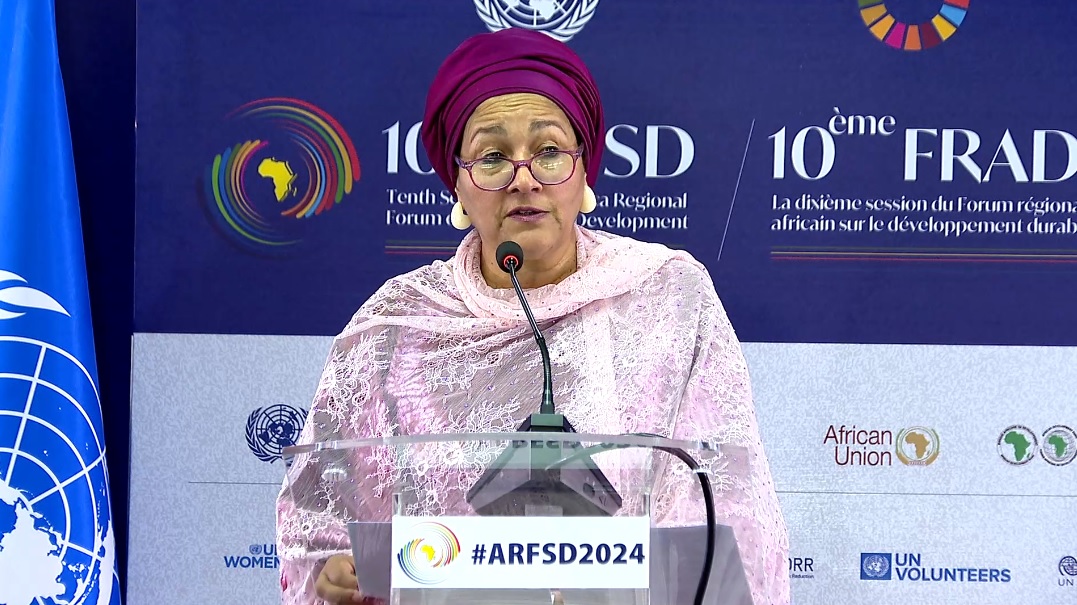In a resolute address at the outset of the tenth Africa Regional Forum on Sustainable Development (ARFSD-10) in Addis Ababa, Ethiopia, on April 23, UN Deputy Secretary-General Amina Mohammed emphasized the pressing need for increased capital flows into developing countries, particularly in Africa, to effectively implement the SDGs. Mohammed called upon the international community to rally behind Africa’s development vision outlined in both the SDGs 2030 agenda and Agenda 2063.
Addressing a diverse audience including member state representatives, youth, civil society, and private sector actors, Mohammed highlighted the significant challenges facing African nations, such as debt servicing, rising interest rates, and constrained fiscal space. She underscored that debt servicing in Africa has reached unprecedented levels due to external shocks, leaving minimal resources for sustainable development investment. Last year, debt servicing accounted for a staggering 47.5% of government revenue in Sub-Saharan Africa.
Mohammed stressed the necessity of securing at least $500 billion annually to facilitate affordable long-term financing for development, alongside reforms within the international financial architecture. Echoing Mohammed’s sentiments, Uganda’s Prime Minister, Robinah Nabbanja, emphasized the imperative for global financial architecture reform to ensure favorable financing terms for developing countries, crucial for fostering sustainable economies.
The forum, themed “Reinforcing the 2030 Agenda for Sustainable Development and Agenda 2063 and eradicating poverty in times of multiple crises: effective delivery of sustainable, resilient, and innovative solutions,” also saw input from Amb Claver Gatete, Executive Secretary of the Economic Commission for Africa (ECA). Gatete highlighted the necessity for innovative financing mechanisms and reforms within the global financial system to unlock sustainable investment avenues in Africa.
Gatete underscored the importance of leveraging Africa’s abundant natural resources, particularly critical minerals vital for the global transition to green economies. He emphasized renewable energy as a cornerstone for sustainable development, presenting untapped opportunities for driving investments and promoting energy security across the continent.
Moreover, Gatete outlined six transition pathways identified by the UN system as key investment avenues for SDGs delivery, including food systems, energy access, digital connectivity, education, employment, social protection, and climate action.
The forum also addressed the pressing issue of climate challenges in Africa, which annually reduce budgets by up to 5% of GDP. The African Continental Free Trade Area (AfCFTA) was highlighted as a unique opportunity to bolster agribusiness and enhance food security, crucial for resilience in the face of multifaceted challenges.
In her remarks, Monique Nsanzabaganwa, Deputy Chairperson of the African Union Commission, emphasized the importance of strong institutions and domestic resource mobilization for realizing Africa’s development aspirations.
Additionally, Fitsum Assefa, Ethiopia’s Minister of Planning and Development, urged countries to harness youth-driven innovations to accelerate progress towards the SDGs. Assefa highlighted Ethiopia’s strides in mobilizing domestic and international resources for sustained economic growth and development.
The outgoing bureau chair of ARFSD, Niger’s Hydraulics, Sanitation, and Environment Minister Maizama Abdoulaye, emphasized the crucial role of inclusive sustainable development in transforming Africa into a continent of opportunities. Abdoulaye advocated for investments in blue and green bonds, emphasizing their potential to drive infrastructure development.
Established in 1958 by the Economic and Social Council (ECOSOC) of the United Nations (UN), the United Nations Economic Commission for Africa (ECA) aims to promote economic and social development, foster intra-regional integration, and facilitate international cooperation for Africa’s development. With 54 member states, ECA plays a pivotal role as both a regional arm of the UN and a key component of Africa’s institutional landscape.

